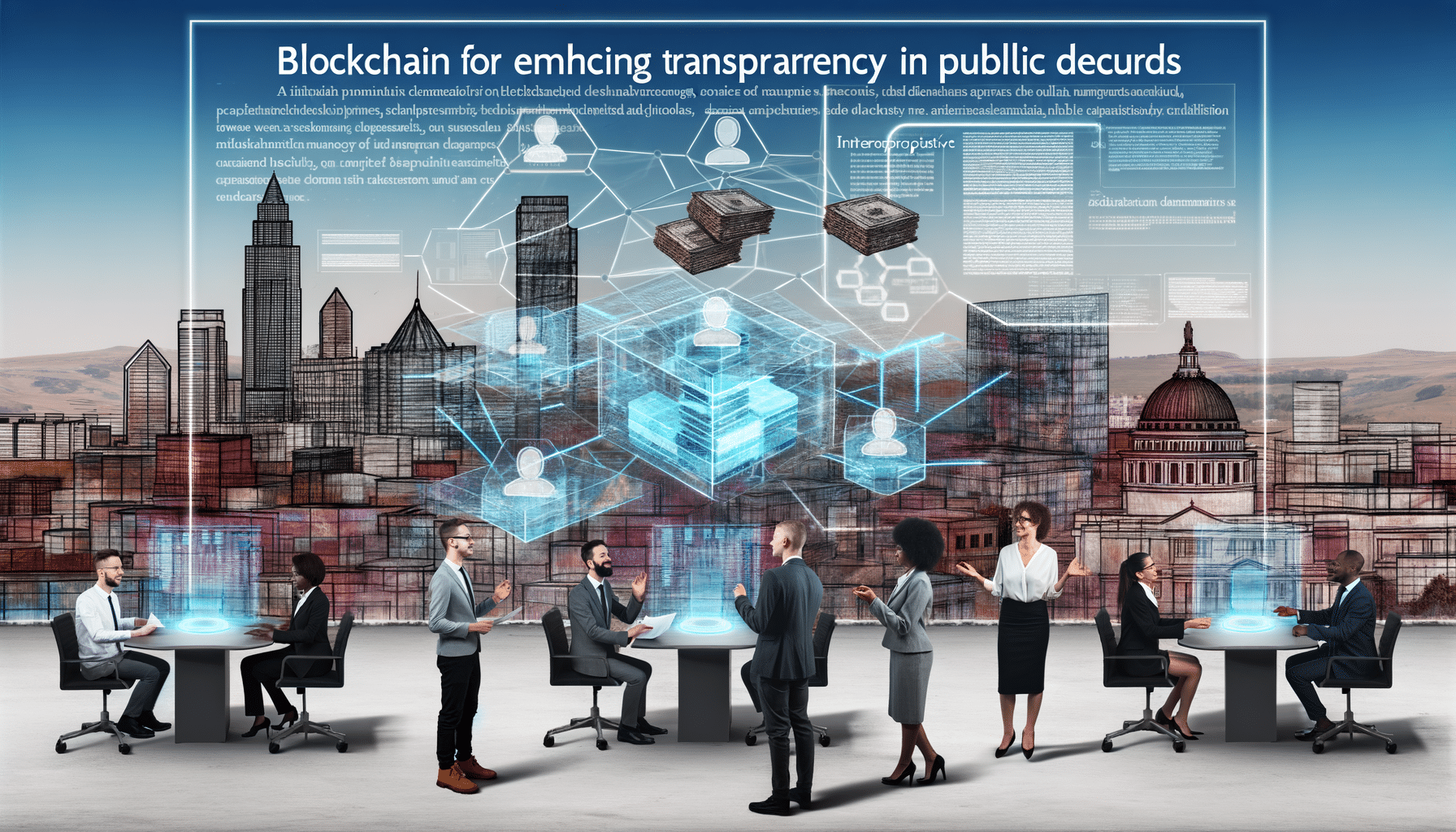- AI in Government
- November 16, 2024
Blockchain in Municipal Records Management

Revolutionizing Municipal Records Management through Blockchain
In the realm of municipal records management, a seismic shift is underway, driven by the integration of blockchain technology. As someone at the forefront of leveraging cutting-edge technologies for record management, I am thrilled to share the transformative potential blockchain holds for municipal transparency. Our journey at RecordsKeeper.AI has illuminated how blockchain can fundamentally change how municipalities handle records, enhancing trust, security, and efficiency.
Understanding the Challenges of Municipal Records
Municipal records are the backbone of local governance, encompassing everything from property deeds and birth certificates to council meeting minutes. Managing these records efficiently and transparently has long been a challenge for municipalities worldwide. The current systems often struggle with issues such as inefficiency, lack of transparency, and potential for manipulation, leaving both officials and citizens frustrated.
Blockchain promises a radical transformation by addressing these pain points. As an immutable ledger, blockchain offers the decentralization and transparency required to restore trust and streamline processes.
Enhancing Transparency with Blockchain
Transparency is a cornerstone of effective governance, yet it remains elusive in many municipal operations. With blockchain, every transaction or record entry is time-stamped and cannot be altered retroactively. This creates a transparent, auditable trail that citizens and officials alike can trust. Imagine having the assurance that all decisions, expenditures, and resource allocations can be traced back to their origins seamlessly. Such transparency not only builds public confidence but also fosters a culture of accountability.
A Secure Repository of Municipal Records
Security is paramount when dealing with municipal records. Traditional record-keeping methods expose data to risks such as unauthorized access or loss due to natural disasters or human error. Blockchain, however, acts as a fortified vault, protecting records with advanced cryptographic security. The decentralized nature of blockchain means records are not housed in a single location, eliminating a single point of failure.
Additionally, blockchain’s consensus algorithms ensure that the data integrity is maintained. Transactions recorded on a blockchain are verified by multiple nodes in the network, ensuring accuracy and authenticity. This is a significant deterrent to tampering and fraud, enhancing the safety and reliability of municipal records.
Streamlining Compliance and Efficiency
The dynamic regulatory landscapes that municipalities operate within necessitate agile record management solutions. With blockchain, compliance becomes more straightforward. Automated smart contracts can be programmed to enforce regulatory standards automatically, ensuring that records adhere to laws like GDPR or local governance codes without constant manual oversight.
Moreover, the efficiency gains from employing blockchain are significant. Transactions that once took days can be completed in minutes, freeing up valuable time and resources for municipal staff. This allows them to focus on more strategic initiatives rather than mundane, time-consuming record management tasks.
Blockchain Integration: A Necessary Evolution
Transitioning to a blockchain-based system may seem daunting, but the benefits it yields are revolutionary. At RecordsKeeper.AI, I have witnessed firsthand how change can redefine operations and modernize practices. Blockchain integration is no longer a mere option but a necessary evolution for municipalities striving for transparency and efficiency in the digital age.
By leveraging blockchain technology, municipal record management can move beyond the limitations of traditional systems. This evolution is not just a technical upgrade—it’s a transformation in how municipalities interact with their records and constituents.
Charting the Future of Municipal Records
The adoption of blockchain in municipal records management holds the promise of more transparent, efficient, and secure local governance. By embracing blockchain technology, municipalities can not only address current inefficiencies but also future-proof their operations against new challenges.
At RecordsKeeper.AI, facilitating this digital transformation is more than just a mission; it is an opportunity to empower municipalities to harness the full potential of technology for the greater good. I welcome you to explore how blockchain can bolster transparency and enhance trust in your municipal operations. Join us on this journey to modernize record management and contribute to a future where transparency is no longer a goal but a given.
For more insights into how we are transforming record management with technology, and to stay updated on the developments in this space, follow my journey at RecordsKeeper.AI. Together, let’s pave the way for transparent, accountable, and efficient municipal governance.
Toshendra Sharma is the visionary founder and CEO of RecordsKeeper.AI, spearheading the fusion of AI and blockchain to redefine enterprise record management. With a groundbreaking approach to solving complex business challenges, Toshendra combines deep expertise in blockchain and artificial intelligence with an acute understanding of enterprise compliance and security needs.
Related Posts

Blockchain in Public Procurement Transparency
Enhancing transparency in public procurement through blockchain.
- November 16, 2024

Blockchain for Enhancing Transparency in Public Records
Promoting transparency in government records using blockchain.
- November 16, 2024
Archives
- January 2025
- December 2024
- November 2024
- October 2024
- September 2024
- August 2024
- July 2024
- June 2024
- May 2024
- April 2024
- March 2024
- February 2024
- January 2024
- December 2023
- November 2023
- October 2023
- September 2023
- August 2023
- July 2023
- June 2023
- May 2023
- April 2023
- March 2023
- February 2023
- January 2023
- December 2022
- November 2022
- October 2022
- September 2022
Want to get more content like this?
Signup to directly get this type of content to your inbox!!
Latest Post
Document Control for Equipment Maintenance
- January 20, 2025
Managing Records for Multiple Clients
- January 19, 2025
Handling Conference Documentation
- January 18, 2025
Setting Up Department Record Reviews
- January 17, 2025





